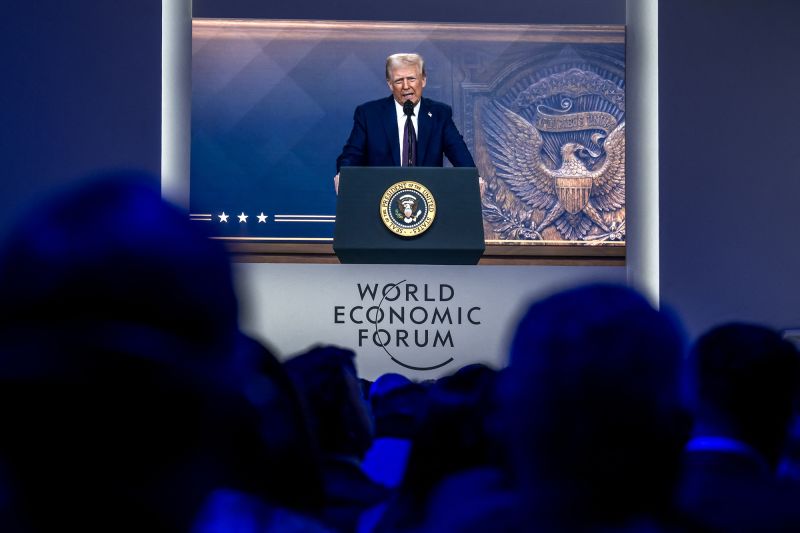
US President Donald Trump’s policy on Ukraine is a little scattered and meandering, and at times misinformed. But be in no doubt that it exists and seems an unanticipated priority.
Trump’s policy on Ukraine distinguishes itself in two ways in the first week of his administration.
The first is his persistent criticism of the economic damage the Kremlin head is doing to Russia. Trump is making a business case for a peace deal, telling Russian President Vladimir Putin he needs to make a pact for financial reasons.
This may misread Putin’s apparent pathological commitment to victory, and the broad existential nature of the conflict for Moscow in the eyes of its propagandists. They see this as a war against the entirety of NATO that they must win. The propaganda taps of Russian state media can be turned off as well as on. But Russia’s mindset is radicalized where the West’s is not. It’s not a business case of quarterly profit and loss for the Kremlin, but one of survival.
The second is how regularly Trump talks of the war after excluding it — and any mention of Ukraine and Russia — from his inauguration speech on Monday. He correctly suggested Thursday a lower oil price could impede Russia’s ability to wage war. Russia sells oil to China and India to keep its war machine going, despite sanctions aimed at reducing its revenue.
Trump said he would talk to North Korea’s Kim Jong Un, whose troops are fighting for Moscow now in Kursk. He also correctly suggested Beijing has great influence over Moscow and could force a peace deal upon them.
Again, Trump is approaching the conflict from his comfort zone: one where everyone is seeking a smooth deal that makes them richer. China may seek calm, and perhaps ultimately wish the Ukraine conflict had never begun. But that is not the reality of now, and instead Xi Jinping is treading a delicate path: watching his ally Moscow degrade their military and economy to the extent they become Beijing’s junior partner, while also realising Russia cannot lose the fight without a knock-on impact to China’s global ambitions.
The calculations made now by America’s adversaries concern the world order over the coming decade, not the immediate telephone call sheet of the White House, or how fast slick interpersonal dealings might wrap up the biggest land conflict in Europe since the 1940s.
Trump’s repeated call for NATO’s European members to pay more for defense – an unlikely demand of 2% of GDP rising to 5% – has even been echoed by Ukraine’s President Volodymyr Zelensky.
It is correct to state this is Europe’s war. If Kyiv loses, Poland, the Baltics, Romania and Moldova will feel the heat, not Florida or California. Even NATO’s head, Mark Rutte, has suggested Europe might buy arms for Ukraine from the United States. Trump was always going to challenge the cost of the war to Washington, and speedily Europe is being backed into a corner to step up.
It is also intriguing to see Trump talk of the damage the war has done. He said incorrectly Thursday millions had died on both sides. Kyiv has said 43,000 Ukrainian troops have died. The UN says about 12,000 Ukrainian civilians have died.
Western officials say regularly Russia’s losses amount to 700,000 dead and injured, and independent media have tracked nearly 100,000 public records that suggest Russian military deaths on the battlefield.
Yet Trump’s incorrect, emotional reference to millions may be aimed at evoking the urgency and horror of the war in the minds of an American audience for whom it is a side issue rarely discussed.
Trump said he could bring peace to Ukraine in 24 hours, which was always a wild rhetorical exaggeration. Even the six months now evoked is optimistic. But he has taken office seized with a wobbly yet vivid grasp of the war’s issues. That may falter, as he slowly realizes a deal is not low hanging fruit and his adversaries – because that is what Putin is, however “great” Trump says they get along – are more patient, enduring and conniving than he is.
But his opening week has done much to dispel the greater fear from Ukraine and its allies that Trump preferred coziness with Putin to NATO’s unity. Or that his wild and unrealistic promises of diplomacy from the campaign trail would evaporate – along with funding for the war – the moment he came to office. This may all still happen, and the road ahead for Trump is deeply complex and fraught with rivals who have years more experience in the job, and much more to lose or gain.
But Trump is seized of the issue, has an emotional albeit shaky grasp of the war’s horrors, and is critical of, not fawning towards, Putin. It’s yet another unforeseen turn in a conflict ruled by the unexpected.

